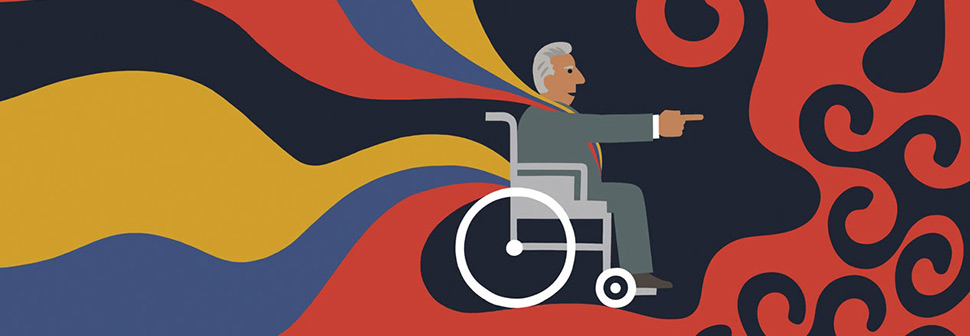Ecuador waits for Lenín Moreno


Will the new president be less authoritarian than his predecessor?
IN A burst of hyperbole and historical confusion, Rafael Correa compared the run-off election in Ecuador last month to “the battle of Stalingrad” in which his left-wing government was “fighting against the global right wing”. Yet the outcome was far from the rout achieved on the Russian steppes: rather, Mr Correa’s candidate, Lenín Moreno, achieved a narrow victory, by 51% to 49% over Guillermo Lasso, a conservative banker. Even so, the result interrupted the recent ebbing of the “pink tide” in South America that has seen several electoral victories for the centre-right.
The prospects for Mr Moreno’s presidency, which begins on May 24th, are unusually uncertain. His first task is to establish his legitimacy in practice. Some in the opposition question his victory. The electoral authority’s computers briefly shut down with Mr Lasso in an early lead. The police raided Cedatos, Ecuador’s most reliable polling firm, confiscating its computers, after it published an exit poll giving Mr Lasso victory. The government-controlled electoral authority refused Mr Lasso’s demand for a full recount. Nevertheless, the region’s governments were swift to congratulate Mr Moreno. Preoccupied by Venezuela, the last thing they want is another conflict.
Mr Moreno owed his victory mainly to Mr Correa’s achievements over more than a decade in power. Helped by the high price of oil for much of his tenure, he brought stability to a country that had seen eight presidents, three coups and a currency collapse in the previous 11 years. He invested in new roads, hospitals and social assistance, while also boosting public employment. The poverty rate fell from 40% in 2006 to 23% last year. He used his popularity to create an elected autocracy. Under his notorious communications law, the media have faced stiff fines when they have published articles the president considers defamatory and—even more outrageously—when they have not published articles he thinks they should.
In the end Mr Correa overreached. He failed to save any of his petro-windfall. As oil revenue fell, and public spending with it, the economy has been contracting for almost two years. The president lost the urban middle classes when he tried to raise taxes. A more united opposition might easily have won the presidential election. Mr Correa’s Alianza PAIS (Country Alliance) party received only 39% of the vote in February’s legislative election, though it won 74 of the 137 seats in the National Assembly thanks to gerrymandering.
All this means that Mr Moreno has a difficult inheritance. The most important question for Ecuador, so far unanswered, is whether he is his own man, or merely Mr Correa’s stooge. And if he is independent, what kind of politician is he? In a wheelchair since he was mugged in 1998, Mr Moreno was Mr Correa’s vice-president from 2007 to 2013. He is more conciliatory than his combustible predecessor. He has friends in the private sector, but also among left-wingers who fell out with Mr Correa. Which of these two groups he favours will become clearer once he announces his cabinet.
Whatever his preferences, his actions are likely to be constrained by Ecuador’s difficult circumstances. The fiscal deficit has averaged 5% of GDP since 2013. Because the country uses the dollar as its currency, it cannot print money. It has plugged the gap partly through issuing international bonds, but investors are now demanding an interest rate of around 10%.
Last month Mr Moreno received Yanis Varoufakis, a leftist former Greek finance minister and now a well-paid star of the speaker circuit, who urged on him the virtues of paying suppliers and public workers with electronic money. Mr Correa enacted laws to allow this. But any attempt to use them to finance the deficit risks triggering a run on banks and capital flight, as savers might fear that their money would not be returned in dollars. Dollarisation is popular, though. Mr Moreno’s choices may thus come down to cutting spending with an IMF agreement or without one. Neither is politically palatable.
Ecuador is not Venezuela, thanks partly to its dollarisation and to the independence of the armed forces. But neither does it enjoy vigorous checks and balances. Mr Moreno does not criticise Mr Correa’s “21st-century socialism”, a term copied from Hugo Chávez, but he says its time has passed. “Now a new time is coming,” he promises, marked by dialogue and tolerance. He has made a vague promise to reform the communications law.
Mr Correa plans to move to Belgium, his wife’s home country. Left to his own devices, Mr Moreno might engineer a soft landing for Ecuador, both economically and politically. Will he be allowed to?
The Economist | Bello





